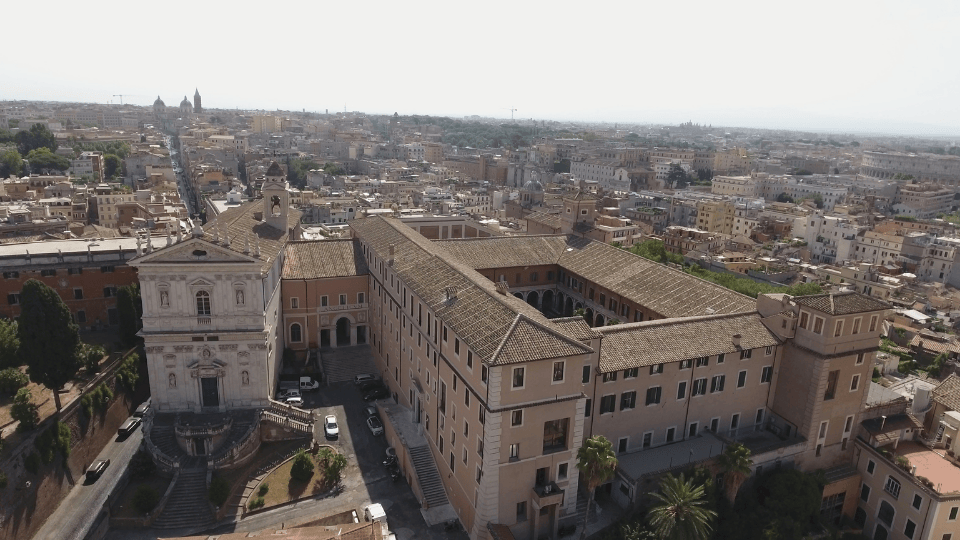
The Pontifical University of St. Thomas Aquinas is communicating the richness of Catholic tradition far beyond its classrooms, guiding the faithful to respond to the challenges of modern life.
SIGN UP FOR OUR NEWSLETTER HERE
The Pontifical University of St. Thomas Aquinas has launched “Fraternitas: An Introduction to Catholic Social Thought,” a 20-episode video series that explores the foundations of Catholic social ethics. The series is the first project of the university’s new digital platform, Angelicum Media.
Dominican Father Philip-Neri Reese, professor of philosophy at the Angelicum, as the university is commonly known, told the Register that the series aims to give a “comprehensive account of Catholic social thought,” which “came to mind precisely because it’s such an important part of our faith and it’s such a profoundly misunderstood part of our faith.”
“We want to make it clear to people what Catholic social thought is and what it isn’t,” said Father Reese, who is also director of the Angelicum Thomistic Institute, “because for many people, they think of Catholic social thought as sort of social activism just dressed up in theological language, and it absolutely isn’t.”
Catholic social doctrine, he emphasized, “is part and parcel of the Catholic tradition from the very beginning of the Church.”
An Undertaking ‘Ever Ancient, Ever New’
The Church’s social teaching is a treasury of wisdom about building a just society and living lives of holiness amidst the challenges of modern society.
Its foundation was laid in 1891 with Pope Leo XIII’s encyclical Rerum Novarum, which addressed the conditions of workers during the Industrial Revolution and laid out principles for how society, the economy and politics should serve the dignity of the human person and the common good.
Citing St. Augustine’s teaching that “the Lord, and by extension, the Church is ever ancient, ever new,” Father Reese said that the Pope “was doing something ever ancient, ever new, by applying the core teachings of the Gospel to modern social problems.”
“Leo XIII and his pontificate did so much that was new and innovative and creative, in the period of the modern Church, but it was always deeply in continuity with the fundamentals of the faith that have always been there.”
“That’s actually something that the Church has always been doing in every time, in every age, and hopefully we can continue to do today,” the priest added.
Family as the Foundation of Society
The name of the series, Fraternitas — which means “fraternity” or “brotherhood” in English — reflects the series’ focus on how family is the foundation for building a just and caring society rooted in respect for every person and the common good.
“One of the key principles of Catholic social doctrine is the principle of subsidiarity,” according to which larger institutions in society should not overwhelm or interfere with smaller or local institutions, but “respect and incorporate them,” Father Reese said.
This mean that “family has an absolutely ineradicable importance in the way that the Church thinks about questions of social importance in our world,” Father Reese explained.
“To think of ourselves as fundamentally brothers and sisters, so not fundamentally individuals, not fundamentally citizens of a sort of abstract state, but as first and foremost part of a family — that is, the core fundamental unit from which everything else builds.”
In a way, Catholic social doctrine can be understood as the “Goldilocks principle,” Father Reese explained. “What the Church teaches is the way of thinking about these social ethical and moral questions in a way that’s just right.”
Father Reese offered an example: “For capitalists, when they look at Catholic social thought, they’re going to say it’s too community-focused and it doesn’t appreciate the individual enough. For socialists, they’re going to say it’s too individual-focused and it doesn’t appreciate the community enough.”
“But from the perspective of the truth,” he said, “Catholic social doctrine is just right. It’s the thing that integrates the individual and the community in a way that values both and denigrates neither.”
Principles Don’t Change; Applications Do
The series addresses what truth, rights, freedom, property and justice are.
Dominican Father Thomas Joseph White, rector of the Angelicum, tackles truth in relation to community life, for instance.
“The search for the truth is at the heart of the identity of the human person,” Father White explains. “Consequently, Catholic social thought has a great deal to say about the truth as a common good, that is, at the heart of the human community. It also has a great deal to say about our social obligations, rights and privileges in regard to the truth. St. Thomas Aquinas defines truth as an adequate correspondence of the human intellect with a given reality under consideration. Our human thoughts are true when what we think corresponds rightly to whatever reality we contemplate considered in itself. Social life is largely composed, then, of the giving and receiving of truth in a shared life with others.”
The goal is to give viewers a clearer grasp of the natural and theological principles that guide moral and civic life. It looks at how these principles speak to today’s biggest challenges — from economics and politics to ecology and global conflict.
Sharing her thoughts on the Church’s social doctrine, Evelyn Blacklock, coordinator of Angelicum Media who oversees content, production management and postproduction, said that “this is not some kind of optional appendage,” explaining: “Social life — we’re all living it, all the time, and the question is, how do we live it?”
The aim is to reach a wider audience, since Catholic social doctrine touches everyone.
Blacklock explained that questions of social morality and social ethics are questions that men and women have always asked themselves, starting in the early Church, when “Christians were trying to think, ‘What does it mean to live as a Christian in social life, in the Roman Empire?’ for example.”
“This body of thought,” she explained, “is about principles that don’t change but applications that do change.”
“New problems are always arising. So the continuity is with the principles, which don’t change, but we do have to think in every era with every new problem about how we take these principles and apply them to a problem that we haven’t encountered yet.”
Guided by St. Thomas
Beyond publishing these videos on social-media platforms like YouTube and Instagram, Angelicum Media has created a website offering free quizzes, reading materials and other educational resources. So far, the response from users has been overwhelmingly positive.
“Our patron is St. Thomas Aquinas. Of course, we study all thinkers, but St. Thomas has an especially comprehensive way of bringing things together,” Blacklock said.
“I think we’re in a good position to integrate knowledge in a world where knowledge is very fragmented, [showing] how natural theology and revelation work together in the field of social ethics to form the body of teaching we call Catholic social teaching.”
Equipping the Faithful
Through the series that “systematically and comprehensively gives the wholeness, the fullness of Catholic social doctrine,” Father Reese hopes those who watch “come away from it with a very clear sense that the Church’s social doctrine is an inseparable part of the Church’s deposit of faith and teaching on morals.”
“You can’t be a good Catholic without understanding this aspect of the Church’s teaching,” Father Reese said, “and you can’t understand what the Catholic Church stands for and what the Catholic Church is trying to teach to the world if you don’t understand the way that her social teaching flows from the Gospel of Jesus Christ.”
This article was originally published by NCRegister.

Bénédicte Cedergren is an Associate Producer for EWTN News Nightly. She is Swedish-French and grew up in Stockholm. After graduating from the University of Stockholm with a degree in Journalism, Bénédicte moved to Rome where she earned a degree in Philosophy at the Pontifical University of Saint Thomas Aquinas. She also sings sacred music and works as a photographer. Passionate about spreading the truth and beauty of the Catholic faith, Bénédicte enjoys sharing the testimonies of others and writing stories that captivate and inspire.







